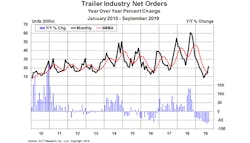ACT: US trailer production shifting to ‘advantage fleets’
Trailer industry net orders now have posted year-over-year declines for 10 consecutive months, according to the most recent issue of ACT Research’s Trailer Components Report.
Year-to-date September net orders are down 54% compared to 2018, ACT maintained, and dry van and reefer net orders both were weaker than the industry average, while only medium lowbeds had a positive y/y result at 3% better than last year.
“While the 2019-20 order season is underway, fleet response has been lackluster,” said Frank Maly, ACT’s director of commercial vehicle transportation analysis and research. “The impact of financial pressures, a combination of weaker freight volume and lower rates for the available freight movement, is an overarching concern.
“The dramatic growth of the trailer fleet in the past few years is also an important factor, resulting in both increased capacity and a dramatically younger fleet, all meaning little incentive for significant capital investment by fleets.”
ACT’s US New Trailer Components and Materials Forecast provides members of the trailer production supply chain, as well as those who invest in suppliers and commodities, with forecast quantities of components and raw materials required to support the trailer forecast for the coming five years.
It includes near-term quarterly predictions for two years, while the latter three years of the forecast are shown in annual details. Additionally, analysis is segment into two categories: those needed for the structural composition of new trailers and those used in production of undercarriage assembly.
“We project softening production into early 2020, with slower line rates and/or reduced days in operation at the OEMs,” Maly said. “A market that was extremely advantageous toward the OEMs as 2019 opened has seen that pendulum shift rather dramatically to ‘advantage fleets,’ meaning price levels will likely be a major topic during ongoing order negotiations.”
ACT’s 62nd seminar is scheduled for Feb 11-13, 2020. It will feature trucker, electrification and economic panels, as well as discussions on near-term demand of North American commercial vehicle markets and the pending impact of electrification on the market in the near future.

